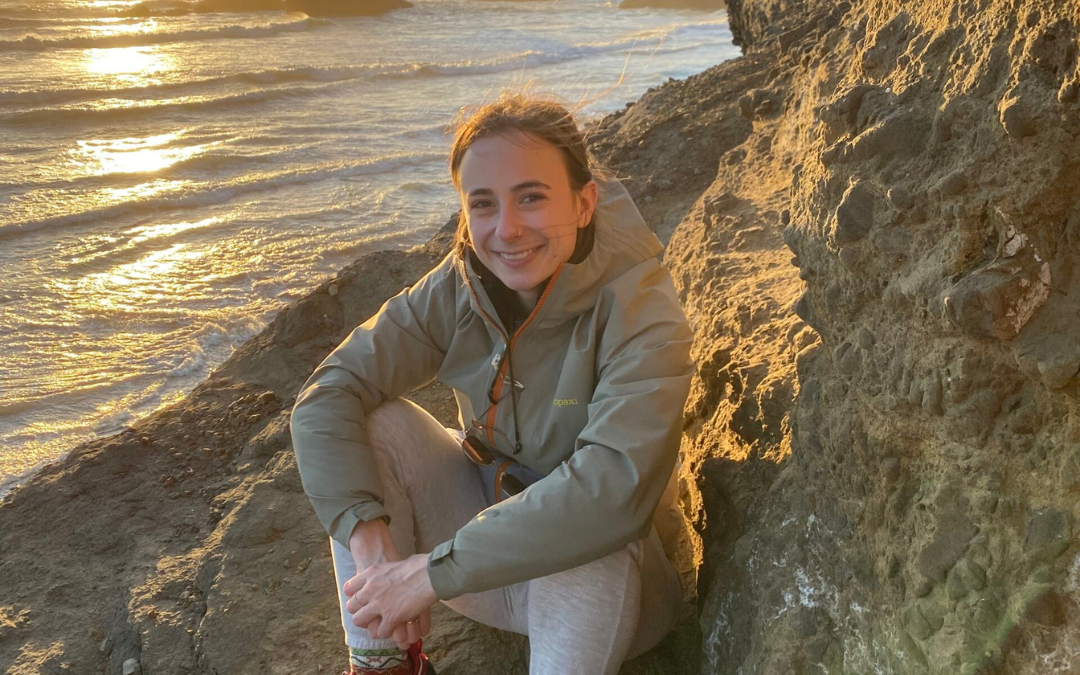
by Guest | Nov 21, 2024 | Featured, Uncategorized, Why I'm In
Written by: Sarah Ermer, MPH, CHES; Prevention Specialist at Tillamook Family Counseling Center
What drew you/your organization to partner with Tillamook County Wellness?
I’m a recent transplant to Tillamook; I moved here at the end of January for my position at TFCC. When I was preparing to move, I was doing some searching online to learn more about health initiatives in the county. I distinctly remember sitting at my parents’ dining room table looking at the Tillamook County Wellness website on my laptop and thinking, “Wow, Tillamook County has a great system for health promotion!” After officially moving and starting at TFCC, I knew I needed to prioritize getting to know as many different people and organizations as I could in order to do my job well. One of the first people I talked to was Michelle Jenck, who is the coordinator for Tillamook County Wellness. My background and current position are well-aligned with Tillamook County Wellness, so she connected me with the Health Promotions committee. The rest is history!
What, if any, changes have you seen come about as a result of this work?
I haven’t been here long enough to say first-hand what larger changes have come about as a result of Tillamook County Wellness, so I’ll share about a moment that stands out to me. One of the first community events I went to was Healthy Kids Day at the YMCA, where the Tillamook County Wellness Access to Physical Activity committee held the Bike Rodeo. I was amazed by the number of bikes and helmets that were available to go home with families! After watching a long line of kids practice bike safety around the parking lot, I have no doubt that even that event alone created positive change.
What have you learned from being involved in this work?
One of my favorite parts of being involved in Tillamook County Wellness, and of Tillamook as a whole, is seeing how the community really does come together to make things happen. I’ve learned a lot about all the systems at play in the area, and the fact that Tillamook County Wellness brings so many of them together is an amazing model for any community that wants to build stronger coalitions. I’ve learned what it really looks like to work as a community!
What are your hopes for this work as it relates to you/your organization?
My work is focused on substance misuse/addiction prevention, and doing that work effectively means looking beyond substance use alone. If we want to prevent young people from drinking or using drugs, we have to be willing to go beyond telling them what NOT to do. It means creating an entire community that supports people who are struggling with their mental health, who need a place to go, or who need positive, healthy activities to help build their confidence. I’ve seen how effective Tillamook County Wellness is in mobilizing people to support health initiatives; I hope that we can continue to mobilize in building support for both physical and mental health access.
What are your hopes for this work as it relates to changing community health in Tillamook County.
Much like my hope as it relates to me/my organization, my hope for our community health is that our collective idea of health and wellness continues to expand. In so many communities, support for different areas of health is siloed. Mental health, physical activity, nutrition, healthcare, social connectedness, financial wellbeing… they all play into our quality of life. I hope that Tillamook County Wellness can continue to be a part of the bridge that connects all these areas of health.
Is there anything else you’d like to share?
Tillamook County has been such a wonderful place to live and work. Thank you to everyone who has been so welcoming! I’m excited to continue to be a part of this community 🙂
For more local health and wellness information, visit www.tillamookcountywellness.org or follow Tillamook County Wellness on Facebook and Instagram.

by Guest | Nov 15, 2024 | Eat Well, Featured, Lunch & Snack Recipes, Recipes
Ingredients
Butternut Apple Filling Ingredients:
1 small (about 1 pound) butternut squash
3 medium tart apples, sliced
2 Tablespoons lemon juice
½ cup packed brown sugar
1 Tablespoon corn starch
1 teaspoon ground cinnamon
½ teaspoon salt
Oat Topping Ingredients:
½ cup all-purpose flour
½ cup oats (old fashioned rolled or quick-cooking)
¼ cup packed brown sugar
¼ cup butter, melted
Directions
- Rinse or scrub fresh fruits and vegetables under running water before preparing.
- Heat oven to 375 degrees F. Lightly grease a 13×9-inch baking dish.
- Peel squash and cut in half lengthwise; discard seeds. Cut squash into thin slices.
- In a large bowl, stir together the filling ingredients until well mixed.
- Pour filling into baking dish. Cover and bake for 20 minutes.
- In a medium bowl, stir together brown sugar, flour and oats. Mix in the margarine or butter and set aside.
- Remove baking dish from oven and sprinkle topping over filling. Return uncovered dish to oven.
- Bake 25 minutes longer or until squash and apples are tender and topping is lightly browned. Serve warm.
- Refrigerate leftovers within 2 hours.

by Guest | Oct 28, 2024 | Being Well, Featured, Uncategorized
…to taking action for breast cancer prevention and healing.
October is breast cancer awareness month. It’s also my birthday month, and I’m happy to say, I’ve come a long way in my healing as I now feel honored to share my birthday month with this awareness as many of us would like to not have to touch it with a 10 foot pole. You see, I’ve learned much about breast cancer from lived experience, both my own diagnosis and one of my sisters. My sister’s story ended with her dying from metastatic breast cancer only 2 years from her original diagnosis. I’m currently 2.5 years out and doing great as I plan to continue to do.
Neither of us were paying enough attention to our risk factors and we had several. There were many factors involved including earlier cancers and radiation treatments, environmental toxin exposures (we all live in a chemical soup world, reducing our exposures and supporting our body’s pathways of elimination are key) emotional and physical overwhelm/high stress, over-nurturing others and under-nurturing the self. Sound familiar anyone? 1 in 8 are the current statistical numbers of breast cancer occurrence among women. Also, did you know? 1 in 100 men are affected. Each story is unique and there are certain things that put each of us in different risk categories.
Knowing our risk factors, how many we have and what we can do to lower our risk factors with lifestyle modification are all within our control. I knew I was in a higher risk category from having had radiation therapy in my early 20’s. I knew I functioned at a high stress level, saw signs of estrogen dominance, was persistently overweight for many years, chronically inflamed and worked nights often as a birth doula plus a few other factors. Yet I just hoped eating organically and not exposing myself to more radiation would keep me healthy. It wasn’t enough. Receiving the diagnosis of invasive ductal carcinoma right after my sister’s passing was a doozy of a hit too, but through my lifestyle adaptions it has ultimately brought me back to my earlier life goal of longevity (living to 100 or beyond!) and living that life in vibrant wellness. Good health has always been a passion of mine, but it’s funny how we can let stress and certain situations lead us to believe we should accept less for ourselves. Ultimately cancer has taught me how to live well again. Thank goodness! However, it was not easy to go through to get myself back on track. I don’t actually recommend it 😉 It is therefore, my pleasure and task to share with others what they can do to ideally avoid diagnosis by steering away from known risk factors and incorporating lifestyle habits that decrease risk factors. I love sharing preventive habits and skills in general for us all (including prevention of other diseases too I’d like to add).
Know your risk factors. How many of these align with you?
Risk factors from CDC
- Being a woman
- Age: most diagnosed after 50
- Having BRCA1&2 genes (genetics can be dimmed or brightened with lifestyle)
- Reproductive history – beginning menstruation before age 12 and menopause after 50 – also – First baby after 30, no breast feeding, no full term pregnancy
- Having dense breast tissue/connective tissue (hard to read in mammograms and needs better lymph movement and movement in general) Ultrasound and thermography** are better at reading dense breast tissue **note that thermography isn’t currently utilized by conventional medicine.
- Having a personal history of breast cancer
- Other breast diseases such as atypical ductal hyperplasia, lobular carcinoma in situ
- Family history of breast or ovarian cancer (with or without BRCA gene) first degree relative; mom, sister, daughter – mother or father side
- Previous treatment with radiation (such as Hodgkins lymphoma also a sign the lymph system needs support)
- Exposure to DES drug – diethylstilbestrol – 1940-1971 – miscarriage prevention (mom and baby at higher risk)
- Not physically active
- Overweight or obesity after menopause
- HRT – hormone replacement therapy and slight increased risk seen from birth control pills.
- Drinking alcohol – risk increases with the more a woman drinks
- Smoking
- Night shift work
I would also add: environmental and food chemical additives that can overload our lymph and endocrine system as well as harm our gut microbiome.
Now to the empowering stuff!
What we can do: Taking action is key!
Eat more whole food plants! Eat more colors, eat seasonally, locally and clean/organic whenever possible. Check out the EWG’s list of clean 15 and dirty dozen to know what produce is ok to buy conventional/clean15 and which are ideal to buy organic/dirty dozen) Visit a local farm and enjoy their produce. They need our business through the cooler seasons too. Add one more vegetable to every meal and one new color a week. Ask about the farm’s growing habits. Find farms that don’t use chemicals. Many practice organic methods but don’t carry the certification yet and they’re happy to answer your inquiries.
Exercise! Move your body in ways that make you happy and feel good. Get moving every day. And this doesn’t mean stressed out running around, no, that’s counter productive. This means, enjoy a walk, hike or bike ride. Prioritize the time to commit to regular movement. You are so worth it! Walk one day, take a movement class another day such as Yoga or Joy Lymph Flow (a class I lead in Rockaway Beach and Nehalem) Tai Chi, Qigong or whatever you fancy, but it should bring ease to your body and time for repose. Turn on the music and dance! A fabulous way to heal many layers and promotes connection and health within the family if you live with others.
Quit smoking and don’t drink alcohol or limit your intake. Mocktails made with herbs are power packed with more phytonutrients that help us stay well and are an actual treat vs. a known risk factor.
Switch to natural household and personal care products. Don’t use anything with “fragrance” listed as an ingredient or chemical names you can’t pronounce or artificial colors. There are so many products out there, it can be overwhelming. Environmental Working Group also has a Skin Deep database listing products that are free from chemicals. It’s not one product that becomes the problem, it’s the many products together, it becomes a toxic load the body can’t handle. Switching to natural cleaners and personal care items actually uplifts our health instead.
Discuss your risk factors with your ND or MD and meet with a health coach like myself for support in making changes to your lifestyle at a pace that works for you to live a life that’s shown to be more preventive in lowering your risk factors and ideally avoiding this disease. I also teach breast massage for self-care and home screening. 3 This article is dedicated to those we’ve loved and let go of too early due to this disease and to those facing it now and in the future. May we all be free, live in flow, know ease and enjoy self care first so we may indeed be well and remain here for others.
Written by Elizabeth Golden Seaver, Health and Wellness Coach, Nehalem, OR and Tillamook County Wellness Coalition Member.
You can reach out to her at: goldenkeywellness.abmp.com, wingforwisdom@gmail.com
Other wellness questions? Email us at info@tillamookcountywellness.org. For more local health and wellness information, visit www.tillamookcountywellness.org or follow Tillamook County Wellness on Facebook and Instagram.

by Guest | Oct 18, 2024 | Eat Well, Featured, Lunch & Snack Recipes, Recipes
This festive combination of high-fiber whole wheat flour and canned pumpkin, creamy high-protein Greek yogurt, and a delicious medley of fall spices will give your little ghouls and goblins the energy they need for all their fun-filled Halloween activities! These pancakes are easy-to-make, wholesomely nutritious, and packed with your favorite flavors of the Fall season.
Ingredients:
- ¾ cup nonfat Greek yogurt
- ¾ cup milk
- 2 tablespoons butter plus additional for cooking the pancakes
- 1 ½ cups whole wheat flour
- 2 teaspoons baking powder
- ¾ teaspoon baking soda
- ½ teaspoon kosher salt
- ¾ teaspoons ground cinnamon
- ½ teaspoon ground ginger
- ⅛ teaspoon ground nutmeg
- ¾ cup pumpkin purée (not pumpkin pie filling)
- 2 large eggs
- 2 tablespoons pure maple syrup or honey
- 1 teaspoon pure vanilla extract
-
FOR SERVING (Optional):
- Pure maple syrup
- Butter
- Chopped toasted pecans
- Vanilla greek yogurt
Instructions:
In a medium bowl, whisk together the Greek yogurt and milk. Set aside and let rest for 5 minutes.
In a small bowl or saucepan, melt the butter. Set aside to cool.
In a large mixing bowl, whisk together the whole wheat flour, baking powder, baking soda, salt, cinnamon, ginger, and nutmeg until evenly combined.
To the bowl with the rested milk and yogurt, add the pumpkin puree, eggs, maple syrup, and vanilla. Whisk until well blended. Whisk in the melted, cooled butter.
Make a well in the center of the dry ingredients. Carefully pour in the wet ingredients. With a wooden spoon or rubber spatula, stir very gently, just until the flour disappears. The mixture will look lumpy. Let rest while the skillet preheats.
To cook: If you’d like to keep the pancakes warm between batches, preheat the oven to 200 degrees Fahrenheit and line a baking sheet with parchment paper. Preheat an electric griddle to 350 degrees F, or heat a large, nonstick skillet or cast iron skillet over medium low. Wait several minutes to allow the skillet fully preheat.
Melt a little butter on the skillet, or coat with nonstick spray. Scoop the batter into 1/4 cupfuls, leaving room for the pancakes to spread. Let cook on the first side until bubbles form on top and the edges of the pancakes look dry, about 4 minutes. Flip and cook on the other side, until the pancakes are golden and cooked through, about 2 to 3 minutes more. Adjust the heat as you go if the outsides begin to darken too quickly, before the insides are cooked through.
Repeat with remaining pancakes, adding more butter or nonstick spray to the skillet as needed and keeping the pancakes warm in the oven between batches as desired. Serve hot, with desired toppings.
Resource: https://www.wellplated.com/healthy-pumpkin-pancakes-recipe/

by Guest | Oct 11, 2024 | Being Well, Featured, Uncategorized, Work Well
Let’s face it: Whether you’re a single parent, have a supportive co-parent, or are part of a large, supportive family system, parenting well is hard. Kids, no matter how much we love them, don’t come with instruction manuals and often push us to our limits.
We want to bring our best selves to this parenting endeavor; we know how we treat and invest in our children will have lifelong repercussions . . . but sometimes we need a little support.
Engaging your child resourcefully, creatively, and educationally, boosting and encouraging playful curiosity, and celebrating developmental milestones—that’s what our family educators do every day. We believe that parents are their kids’ first and best teachers and we want to equip parents to engage their kiddos with creative, fun learning activities all year long.
Did you know that year-round support from Healthy Families and Early Head Start is available to families in every part of Tillamook County? Here’s what you need to know about our three Child & Family Programs, all housed under Community Action Team:
Healthy Families:
– Register your child within 90 days of birth
– Known for their diaper program
– Regular home visits, frequency of visits based on need
– Healthy Families – Community Action Team (cat-team.org)
Early Head Start:
– Registration accepted year-round, ages 0-3
– Weekly home visits
– Biweekly socializations/play dates
– Educational and literacy focus
– Seamless transition to Head Start (preschool, ages 3-5)
– www.nworheadstart.org
Head Start:
– preschool (drop off/pick up)
– only available to families living in Tillamook proper at this time
– 2 locations: 1100 Miller Ave, Tillamook, OR and 3808 12th Street, Tillamook, OR
– www.nworheadstart.org
We are a resource for you and want to make your parenting journey a little less
overwhelming, so you can offer your kiddo your very best self!
To reach out and ask questions, please contact:
Christina Pfister
Family Advocate for Early Head Start
971-813-9450
cpfister@nworheadstart.org
Written by Christina Pfister, Family Advocate for Early Head Start
Other wellness questions? Email us at info@tillamookcountywellness.org. For more local health and wellness information, visit www.tillamookcountywellness.org or follow Tillamook County Wellness on Facebook and Instagram.





